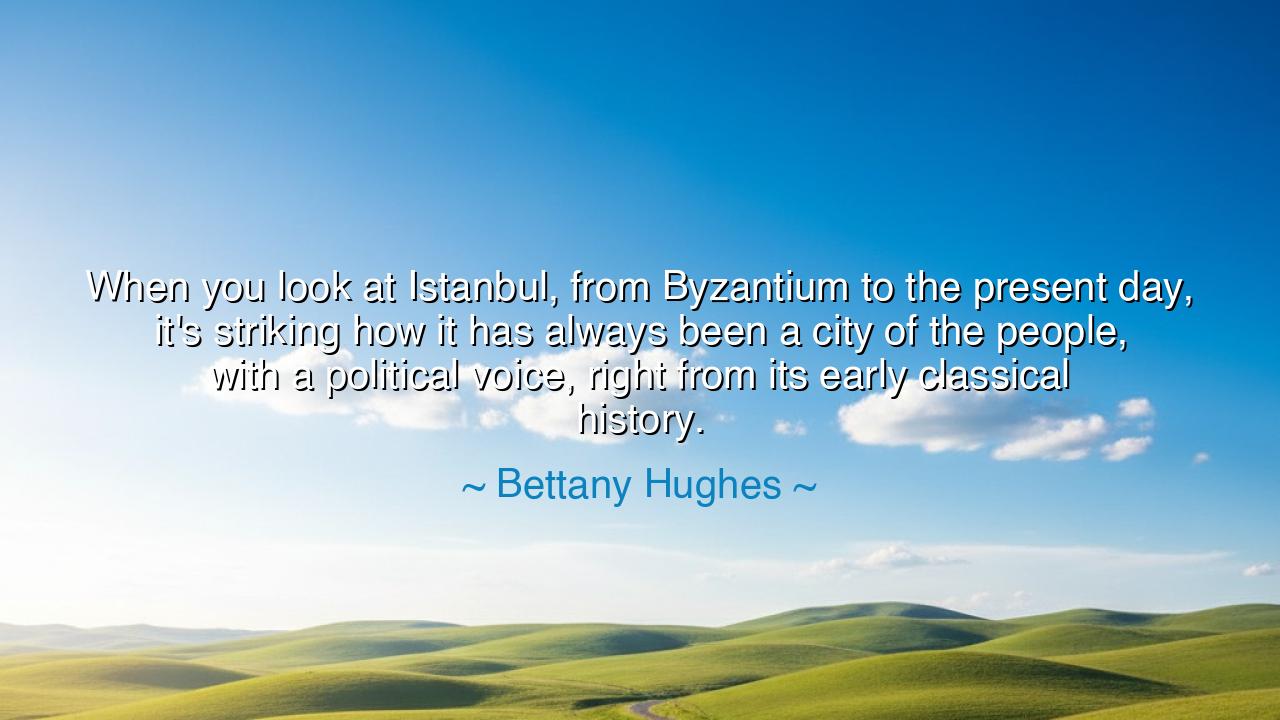
When you look at Istanbul, from Byzantium to the present day
When you look at Istanbul, from Byzantium to the present day, it's striking how it has always been a city of the people, with a political voice, right from its early classical history.






Hearken, children of the ages, and open your minds to the reflection of Bettany Hughes: “When you look at Istanbul, from Byzantium to the present day, it's striking how it has always been a city of the people, with a political voice, right from its early classical history.” Understand this: the life of a city is not measured merely by walls, palaces, or temples, but by the spirit of its people, the pulse of their voices, and the currents of civic engagement that flow through every street and marketplace. Hughes reminds us that Istanbul, through centuries of change, has endured because it has been sustained by the will and participation of its citizens.
From the dawn of Byzantium, the city bore witness to the power of the collective voice. In the forums and agoras, citizens gathered to debate, to elect, to challenge authority. Even as emperors and sultans rose and fell, the heart of the city beat in concert with the concerns, hopes, and protests of its people. Hughes’ observation illuminates a timeless principle: political life springs from engagement, not mere rule, and a city endures when its citizens claim a voice.
Consider the tumultuous events of 532 CE, the Nika riots, when the people of Constantinople rose to challenge imperial authority. Thousands marched, chanted, and demanded justice, demonstrating that even under autocratic rule, the populace possessed agency, courage, and influence. This episode echoes Hughes’ teaching: the vitality of a city resides not solely in its monuments, but in the collective will of its inhabitants, asserting their rights and shaping history.
Even under Ottoman rule, Istanbul retained this character. The marketplaces, guilds, and neighborhoods functioned as networks of civic participation, where opinions, grievances, and aspirations were voiced. Scholars, merchants, and artisans contributed to the political and social life of the city, ensuring that it remained alive with public discourse and the negotiation of power, rather than a mere stage for rulers. Hughes’ words remind us that civic energy is a thread that binds generations together.
In the modern era, Istanbul continues to exhibit this spirit. Street protests, elections, and vibrant cultural debates testify to the enduring presence of political consciousness among its people. Hughes draws a line from classical Byzantium to the present, demonstrating that the city of the people is not a fleeting ideal, but a reality sustained by centuries of engagement, courage, and shared responsibility.
The lesson is profound: the strength and continuity of a community depend upon the active participation of its citizens. Walls may crumble, empires may fall, yet the voice of the people endures, shaping the destiny of the city and preserving its vitality. Hughes’ reflection calls us to recognize the power inherent in collective action and the responsibility of engagement in the life of a society.
Practical action flows naturally. Observe your city, town, or community with awareness. Participate in civic life, speak where injustice arises, vote, deliberate, and contribute to the cultural and political dialogue. Like the citizens of Istanbul across centuries, your engagement sustains the life and health of the community. The vitality of society lies in the active voices of its people, each one a thread in the tapestry of civic resilience.
Children of the ages, remember this: a city is more than buildings; it is the spirit, courage, and voice of its people. Let the words of Bettany Hughes guide your understanding of history and civic life: value engagement, nurture discussion, and recognize that the endurance of a community is built upon participation, courage, and the assertion of collective will. In this, both city and citizen achieve their enduring strength.






AAdministratorAdministrator
Welcome, honored guests. Please leave a comment, we will respond soon